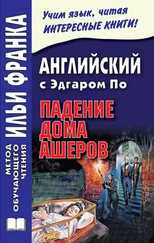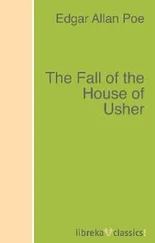Edgar Poe - The Fall of the House of Usher
Здесь есть возможность читать онлайн «Edgar Poe - The Fall of the House of Usher» весь текст электронной книги совершенно бесплатно (целиком полную версию без сокращений). В некоторых случаях можно слушать аудио, скачать через торрент в формате fb2 и присутствует краткое содержание. Жанр: Классическая проза, Ужасы и Мистика, на английском языке. Описание произведения, (предисловие) а так же отзывы посетителей доступны на портале библиотеки ЛибКат.
- Название:The Fall of the House of Usher
- Автор:
- Жанр:
- Год:неизвестен
- ISBN:нет данных
- Рейтинг книги:3 / 5. Голосов: 1
-
Избранное:Добавить в избранное
- Отзывы:
-
Ваша оценка:
- 60
- 1
- 2
- 3
- 4
- 5
The Fall of the House of Usher: краткое содержание, описание и аннотация
Предлагаем к чтению аннотацию, описание, краткое содержание или предисловие (зависит от того, что написал сам автор книги «The Fall of the House of Usher»). Если вы не нашли необходимую информацию о книге — напишите в комментариях, мы постараемся отыскать её.
The Fall of the House of Usher — читать онлайн бесплатно полную книгу (весь текст) целиком
Ниже представлен текст книги, разбитый по страницам. Система сохранения места последней прочитанной страницы, позволяет с удобством читать онлайн бесплатно книгу «The Fall of the House of Usher», без необходимости каждый раз заново искать на чём Вы остановились. Поставьте закладку, и сможете в любой момент перейти на страницу, на которой закончили чтение.
Интервал:
Закладка:
I shall ever bear about me a memory of the many solemn hours I thus spent alone with the master of the House of Usher. Yet I should fail in any attempt to convey an idea of the exact character of the studies, or of the occupations in which he involved me, or led me the way. An excited and highly distempered ideality threw a sulphurous luster over all. His long, improvised dirges will ring forever in my ears. Among other things, I hold painfully in mind a certain singular perversion and amplification of the wild air of the last waltz of Von Weber. From the paintings over which his elaborate fancy brooded, and which grew, touch by touch, into vaguenesses at which I shuddered the more thrillingly because I shuddered knowing not why,—from these paintings (vivid as their images now are before me) I would in vain endeavor to deduce more than a small portion which should lie within the compass of merely written words. By the utter simplicity, by the nakedness of his designs, he arrested and overawed attention. If ever mortal painted an idea, that mortal was Roderick Usher. For me, at least—in the circumstances then surrounding me—there arose out of the pure abstractions which the hypochondriac contrived to throw upon his canvas, an intensity of intolerable awe, no shadow of which felt I ever yet in the contemplation of the certainly glowing yet too concrete reveries of Fuseli.
One of the phantasmagoric conceptions of my friend, partaking not so rigidly of the spirit of abstraction, may be shadowed forth, although feebly, in words. A small picture presented the interior of an immensely long and rectangular vault or tunnel, with low walls, smooth, white, and without interruption or device. Certain accessory points of the design served well to convey the idea that this excavation lay at an exceeding depth below the surface of the earth. No outlet was observed in any portion of its vast extent, and no torch or other artificial source of light was discernible; yet a flood of intense rays rolled throughout, and bathed the whole in a ghastly and inappropriate splendor.
I have just spoken of that morbid condition of the auditory nerve which rendered all music intolerable to the sufferer, with the exception of certain effects of stringed instruments. It was, perhaps, the narrow limits to which he thus confined himself upon the guitar, which gave birth, in great measure, to the fantastic character of his performances. But the fervid facility of his impromptus could not be so accounted for. They must have been, and were, in the notes, as well as in the words of his wild fantasias (for he not unfrequently accompanied himself with rimed verbal improvisations), the result of that intense mental collectedness and concentration to which I have previously alluded as observable only in particular moments of the highest artificial excitement. The words of one of these rhapsodies I have easily remembered. I was, perhaps, the more forcibly impressed with it, as he gave it, because, in the under or mystic current of its meaning, I fancied that I perceived, and for the first time, a full consciousness on the part of Usher, of the tottering of his lofty reason upon her throne. The verses, which were entitled "The Haunted Palace," ran very nearly, if not accurately, thus:
I.
In the greenest of our valleys,
By good angels tenanted,
Once a fair and stately palace—
Radiant palace—reared its head.
In the monarch Thought's dominion—
It stood there!
Never seraph spread a pinion
Over fabric half so fair.
II.
Banners yellow, glorious, golden,
On its roof did float and flow;
(This—all this—was in the olden
Time long ago)
And every gentle air that dallied,
In that sweet day,
Along the ramparts plumed and pallid,
A winged odor went away.
III.
Wanderers in that happy valley
Through two luminous windows saw
Spirits moving musically
To a lute's well-tuned law,
Round about a throne, where sitting
(Porphyrogene!)
In state his glory well befitting,
The ruler of the realm was seen.
IV.
And all with pearl and ruby glowing
Was the fair palace door,
Through which came flowing, flowing, flowing
And sparkling evermore,
A troop of Echoes whose sweet duty
Was but to sing,
In voices of surpassing beauty,
The wit and wisdom of their king.
V.
But evil things, in robes of sorrow,
Assailed the monarch's high estate
(Ah, let us mourn, for never morrow
Shall dawn upon him, desolate!);
And, round about his home, the glory
That blushed and bloomed
Is but a dim-remembered story
Of the old time entombed.
VI.
And travelers now within that valley,
Through the red-litten windows, see
Vast forms that move fantastically
To a discordant melody;
While, like a rapid ghastly river,
Through the pale door,
A hideous throng rush out forever,
And laugh—but smile no more.
I well remember that suggestions arising from this ballad led us into a train of thought wherein there became manifest an opinion of Usher's which I mention not so much on account of its novelty (for other men 1 Watson, Dr. Percival, Spallanzani, and especiall the Bishop of Landaff.—See "Chemical Essays," vol V.
have thought thus) as on account of the pertinacity with which he maintained it. This opinion, in its general form, was that of the sentience of all vegetable things. But, in his disordered fancy, the idea had assumed a more daring character, and trespassed, under certain conditions, upon the kingdom of inorganization. I lack words to express the full extent or the earnest abandon of his persuasion. The belief, however, was connected (as I have previously hinted) with the gray stones of the home of his forefathers. The conditions of the sentience had been here, he imagined, fulfilled in the method of collocation of these stones—in the order of their arrangement, as well as in that of the many fungi which overspread them, and of the decayed trees which stood around—above all, in the long-undisturbed endurance of this arrangement, and in its reduplication in the still waters of the tarn. Its evidence—the evidence of the sentience—was to be seen, he said (and I here started as he spoke), in the gradual yet certain condensation of an atmosphere of their own about the waters and the walls. The result was discoverable, he added, in that silent, yet importunate and terrible influence which for centuries had molded the destinies of his family, and which made him what I now saw him—what he was. Such opinions need no comment, and I will make none.
Our books—the books which, for years, had formed no small portion of the mental existence of the invalid—were, as might be supposed, in strict keeping with this character of phantasm. We pored together over such works as the Ververt et Chartreuse of Gresset; the Belphegor of Machiavelli; the Heaven and Hell of Swedenborg; the Subterranean Voyage of Nicholas Klimm by Holberg; the Chiromancy of Robert Flud, of Jean D'Indaginé, and of De la Chambre; the Journey into the Blue Distance of Tieck; and the City of the Sun of Campanella. One favorite volume was a small octavo edition of the DirectoriumInquisitorium , by the Dominican Eymeric de Cironne; and there were passages in Pomponius Mela, about the old African Satyrs and Œgipans, over which Usher would sit dreaming for hours. His chief delight, however, was found in the perusal of an exceedingly rare and curious book in quarto Gothic—the manual of a forgotten church—the Vigiliae Mortuorum secundum Chorum Ecclesiae Maguntinae .
I could not help thinking of the wild ritual of this work, and of its probable influence upon the hypochondriac, when, one evening, having informed me abruptly that the lady Madeline was no more, he stated his intention of preserving her corpse for a fortnight (previously to its final interment) in one of the numerous vaults within the main walls of the building. The worldly reason, however, assigned for this singular proceeding, was one which I did not feel at liberty to dispute. The brother had been led to his resolution, so he told me, by consideration of the unusual character of the malady of the deceased, of certain obtrusive and eager inquiries on the part of her medical men, and of the remote and exposed situation of the burial ground of the family. I will not deny that when I called to mind the sinister countenance of the person whom I met upon the staircase, on the day of my arrival at the house, I had no desire to oppose what I regarded as at best but a harmless, and by no means an unnatural precaution.
Читать дальшеИнтервал:
Закладка:
Похожие книги на «The Fall of the House of Usher»
Представляем Вашему вниманию похожие книги на «The Fall of the House of Usher» списком для выбора. Мы отобрали схожую по названию и смыслу литературу в надежде предоставить читателям больше вариантов отыскать новые, интересные, ещё непрочитанные произведения.
Обсуждение, отзывы о книге «The Fall of the House of Usher» и просто собственные мнения читателей. Оставьте ваши комментарии, напишите, что Вы думаете о произведении, его смысле или главных героях. Укажите что конкретно понравилось, а что нет, и почему Вы так считаете.




